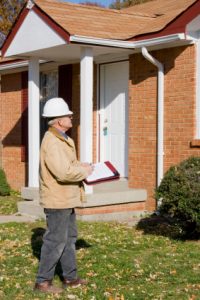A Consumer’s Guide to Home Inspection
A home inspection can offer valuable insight on a home you presently own or one you are considering purchasing.
This information is designed to answer most of your questions about home inspection and choosing a home inspector.
 We all know that . . . Buyers always benefit from a competent pre-purchase home inspection.
We all know that . . . Buyers always benefit from a competent pre-purchase home inspection.
But, did you know that . . . Sellers can also benefit from a home inspection performed on their behalf, because it provides them with valuable information on the condition of the systems and components that were inspected. This enables them to either correct problems or to consider the cost of repairs or replacement when determining the sale price for their home. It also helps to eliminate the “surprises” which might develop before closing. And what is more . . . Even owners of homes which are not for sale can benefit from inspection. Competent home inspectors are knowledgeable and impartial, and since they have no products or repair services to sell, their experience and expertise can help homeowners plan and control maintenance and remodeling costs. Every home needs good care and maintenance, and your home inspector can be your best advisor on this subject.
 What is a home inspection?
What is a home inspection?
A home inspection includes a visual examination of the foundation, structure, and roof; as well as the plumbing, electrical, heating and cooling systems, for any conditions which could adversely affect their normally intended function or operation. It provides valuable information about the condition, operation and maintenance of the systems and components which are inspected. The inspection helps buyers, sellers and owners better assess the need for both immediate and preventive maintenance, thus aiding in controlling and reducing maintenance costs as well as the inconveniences that equipment and structure breakdowns can cause. An inspection is a valuable tool to help you preserve your home investment.
Does a newly constructed home need to be inspected?
Absolutely! It is not uncommon to find gas leaks, improper electrical or plumbing work, roof problems or other undesirable conditions in new homes. While a builder may provide some type of warranty on the home, it is better to discover and correct conditions before you move into your new home. A competent home inspection can often discover faults in the plumbing, electrical or mechanical systems of the new home which, during normal use, may not become evident until after the builder’s warranty has expired! More importantly, the buyer is always in a stronger position to get corrections made before the closing rather than after, no matter how good the warranty. A competent home inspection gets you off to a good start by providing maintenance information that will help you care for your investment.
 What does a home inspector do?
What does a home inspector do?
Your home inspector’s function is to inspect the property, report on conditions found and educate you on the maintenance that your home requires. The inspector can advise you on how quickly certain corrective measures should be undertaken, however, he cannot tell you who is responsible for making those repairs or corrections. Your Inspector is not an appraiser. Although he is eminently qualified to inspect and to assist you in understanding the condition of your home, he is not qualified to give opinions regarding the value of any property or the advisability or inadvisability of purchase. While each inspection company maintains a most liberal follow-up policy regarding consultation with their clients after the inspection, re-inspection of corrective measures resulting from information developed during the inspection is NOT provided. Qualified technicians working daily in their field of expertise are expected to evaluate the conditions noted in the inspection report and make appropriate corrections.
Who does the home inspector work for?
You! The home Inspector should not be affiliated with anyone other than the client who ordered the inspection. Although the Inspector may be referred by a real estate agent, this should not influence the Inspectors report. Very often a home inspector is the only person in a real estate transaction whose interests are entirely those of the buyer (or client) and who enters the property solely on the buyer’s behalf. Inspection services should be carried out objectively and confidentially. The results should only go to the Inspector’s client. Inspectors should have nothing to sell but their experience and expertise. They should be completely impartial sources of advice about your home and its systems as well as any potential need for repairs.
 How significant is the cost of a home inspection?
How significant is the cost of a home inspection?
“You get what you pay for,” is certainly true when it comes to home inspections. In your search for a home inspector you will find that there are home inspectors who charge less than others. Since the cost of any service is determined by the time required and the salary of the person performing the service, generally those who charge less may not have adequate experience and training to do the inspection well and/or they may not spend the required amount of time to do a thorough inspection. Summit Systems Licensees never quibble with the fees which others charge. They know that other home inspection companies are, themselves, the best judge of what their services are truly worth.
Are previous Inspection reports reliable?
Often not. Such inspections are not reliable sources of information, both because they have been performed for other parties and because they often do not contain current information. Parties such as lending institutions, relocation companies or governmental agencies will have interests which are very different from those of a home buyer or owner. In addition, conditions may have changed dramatically since a previous inspection was performed. By scheduling your own inspection you will receive information on the current condition of the home as well as maintenance and other important educational information that is provided for you and no one else. Remember, your home inspector is often the only professional who enters the home solely on your behalf!
How do I get the most out of my home inspection?
Many companies allow the inspector a minimum of one and a half hours to do the inspection itself. This gives them time to do a thorough inspection without being distracted. After that time, we highly recommend that you come in for the walk-through. Dress appropriately. You may want to get down on your hands and knees to look at something with your inspector, or you may want to enter an under-building crawl space to learn about maintaining your furnace. Bring a clipboard or other sturdy writing surface and a pad and pen so you can take maintenance notes during the walk-through. (We recommend you leave children and pets with a sitter so that your time at the inspection will be without distraction.) The inspector will point out anything he has found, answer all of your questions and go through the report with you. We recommend that you read through your entire report as soon as you can, so that you understand it thoroughly.
Do inspectors give estimates for conditions needing repair?
Generally, no. In some instances, an inspector may have the requisite experience to provide “ballpark” estimates. Remember, when you ask your home inspector to provide costs, you’re asking him to place a value on another individual’s labor and materials. While individual inspectors may choose to estimate the cost of repairs, cost estimation should not be expected.
What is the difference between a home warranty and a home inspection?
A home inspection is not a warranty. An inspection is an examination for, and documentation of, specific conditions which adversely affect the components inspected. A warranty is a pledge made by the original manufacturer of a product to repair, replace or correct specific deficiencies in the product which occur within a stated period of time. The term “warranty” is often misused in reference to insurance plans offered for sale to home buyers. Such insurance typically covers certain components or appliances, and it contains deductibles and numerous disclaimers regarding the items covered. An example of an item typically excluded in such insurance plans is the heat exchanger in the furnace. The heat exchanger happens to be the single most expensive component in the heating plant! If someone offers to sell you some kind of home warranty, be sure to read the entire policy very carefully to be certain that it meets your specific needs. If you want the kind of insurance that these plans or policies provide, consult your real estate professional or insurance agent. If your home inspector offers to sell you one of those insurance policies, he is not working exclusively for you.
What about “warranties” or “certifications” offered at no additional cost?
The easiest answer to this question is to ask yourself, “when was the last time that I received something for nothing?” Such warranties and certifications are primarily marketing devices. When carefully read, they often provide little or no protection. Typically, an Inspector will not certify a component under such a program, unless he is absolutely certain that, given the current age and condition of the component, no problem, outside of specifically disclaimed conditions, could possibly occur.
Do home inspection companies provide guarantees?
Many companies guarantee that they will provide a competent inspection of the systems and components specified in their inspection reports and that their inspections will be conducted in accordance with professionally recognized Standards of Practice. No guarantees regarding the future performance of any system or component should be provided or offered.
Why are specific items excluded from inspection contracts?
Competent inspection of typically excluded items such as swimming pools, hot tubs, solar systems, and lawn sprinkler systems requires significant additional time and highly specialized training and experience. Some inspections such as pest infestation and control require specific state licenses. A competent inspection of a swimming pool or hot tub takes up to two hours often for a separate fee. Some systems may be deactivated for extended periods of time and cannot be inspected. Be aware that if a plumbing system has been winterized and has not been reactivated prior to the inspection, it will not be possible to perform a meaningful plumbing inspection that will conform to our high standards.
How do I arrange for a home inspection?
Call the phone numbers listed on the individual web pages of the Summit Systems Member(s) closest to the property that you want inspected to set up your home inspection and any related services such as a radon test as soon as possible after acceptance of your offer to purchase a home. This will give both you and your inspector maximum flexibility in scheduling. Often, the inspector’s office staff will contact the listing agent’s office and make all the necessary arrangements to coordinate the inspection with the parties concerned. Once you have agreed on the appointed inspection date and time, it is imperative that you honor your commitment to your appointment. After all, by making the appointment, your inspector has committed that time slot to you. It might not be possible for your inspector to adjust to last-minute changes in your schedule and you could end up without an inspection report before your closing.